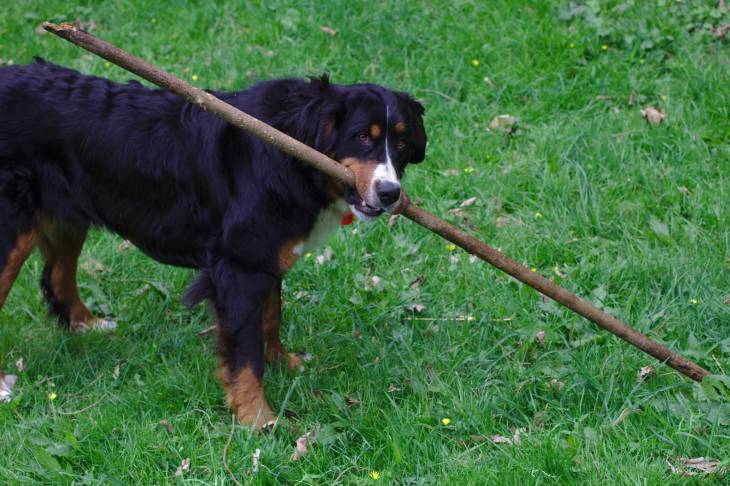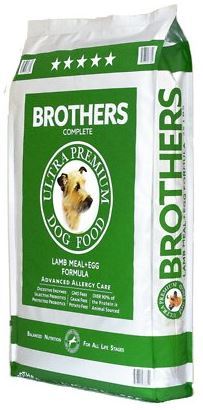What’s the Best Dog Food for Bernese Mountain Dogs?

As a sturdy, smart, and strong dog breed with a friendly personality, this canine is well suited to a number of different activities—including tracking, herding, and obedience training. But what’s the best dog food for Bernese Mountain Dogs? Luckily for you, we’ve done some research on that—and here’s what we found.
Quick Picks: Top Food Choices for Bernese Mountain Dogs
**There's more info below, but you can also click the links above to see current prices or read customer reviews on Chewy.
**Disclaimer: Our dog food reviews are based mostly on (1) our expertise and that of the experts with whom we consult and (2) the information provided by the manufacturers. We do test many dog foods (with our dog's help), but we can't test them all. As such, please remember the above recommendations are our opinions, and you should consult your vet before making changes to your dog's diet.
How Many Calories Does A Bernese Mountain Dog Need?
**Please note: these estimates are based on an average weight for this breed. Every dog is different. Please talk to your vet before making changes to your dog's diet.
Berners are extremely energetic, and require a tremendous amount of exercise on a daily basis. Because of this, they don’t tend to make good apartment dogs. Large fenced-in yards where they can run and play work the best with this breed.
This canine is definitely a working dog—which means that he/she needs at least thirty minutes of exercise on a daily basis (though it would probably prefer three times that much)!
But you also need to be careful. The Berners thick coat will keep him/her nice and warm in the winter, but can cause the dog to overheat in the hot summer months. For this reason, you should try to avoid vigorous exercise when it’s too hot outside.
This dog breed grows to a height of about 2 feet tall at the shoulder, give or take—and will generally end up weighing somewhere between 70 and 115 pounds.
On average, less active Berners will require about 1,500 calories per day, while those who are moderately active may need closer to 1,800. A highly active Bernese Mountain Dog, however, will need quite a few more calories than this to supply them with the energy needed to get through the day. You could find yourself feeding as many as 3,000 calories or more!
20% off at chewy.com
On ALL dog food.
Want More Breed Info? Check This Out...
Macronutrient Needs Of The Bernese Mountain Dog
This is a dog that tends to have quite a few health challenges—so a diet that’s rich in nutrients, quality amino acids, and Omegas is especially important. It’s also important to keep their immune system running at full-capacity, so a dog food formulation that contains a lot of vitamins, minerals, and antioxidants is a must.
Because Berners can be prone to cancer and other similar health problems, it’s best to avoid grains in their diet—so a grain-free food is really a must! A lot of people don’t realize it, but processed grains are believed to be a dangerous source of carcinogens in dogs.
Ingredients like flaxseed, garlic, and fish oil are also recommended for this dog—as these are said to help prevent cancer and other related diseases.
Check out this article (posted on embracepetinsurance.com) for more information on how to prevent cancer in dogs.
Common Health Problems

Unfortunately, Berners tend to have a lot of health problems. Some attribute this to their limited genetic foundation, while others believe that it might be due to reasons that haven’t been discovered yet.
As it is, the lifespan of a Bernese Mountain Dog is relatively short (6 to 8 years)—but totally worth it!
This is an amazing dog breed—and even though they can be prone to a few different health problems, you’ll never regret making room for one in your life. If you’re a dog lover at all, then you’ll quickly realize that the Bernese Mountain Dog is a special, one-of-a-kind breed!
Cancer
Cancer is a relatively big problem for Berners, and is an unfortunately common cause of early death among dogs within the breed. Some symptoms of this disease could include abnormal sores or swelling. Also be on the lookout for sores that don’t seem to heal, or for bleeding originating from internal orifices.
Some believe that avoiding grains in your dog’s diet can help to prevent cancer. In fact, this article on whole-dog-journal.com had quite a bit to say about dogs, diets, and cancer—and I would definitely recommend it as reading for anyone who owns a Bernese Mountain Dog.
Portosystemic Shunt
This congenital abnormality (also known as PSS) causes blood vessels to bypass the liver. This means that the blood doesn’t get cleaned as it should—which can cause a number of different problems. Some symptoms of this condition in Berners could include behavioral abnormalities, gastrointestinal issues, urinary tract problems, low blood sugar, and stunted growth.
Surgery is usually required to correct the problem, though many believe that a grain and gluten free diet is the best start to preventing most of the common liver problems that dogs experience today—including PSS.
Bloat
Bloat, also known as ‘Gastric Torsion’, is a condition that tends to affect larger, deep-chested dogs like the Bernese Mountain Dog more often than small breeds. Basically, this occurs when the stomach gets twisted within the dog’s body, trapping gas and air inside. The condition can be fatal if the dog doesn’t receive immediate medical attention to correct it.
Some symptoms of bloat can include a distended abdomen, lethargy, depression, restlessness, retching without actually throwing up, weakness, or an increased heart rate.
One of the best ways to avoid bloat is to feed your dog in several smaller portions at a time rather than in one large meal at the beginning or end of the day. It may also help to avoid exercising your dog right after eating or drinking.
For a complete list of symptoms and more information about this condition, check out this article.
How To Feed A Bernese Mountain Dog Puppy
Berners seem to do the best when weaned somewhere around the 3rd and 4th weeks of age. For the first week of the weaning process, their mother’s milk should be supplemented by puppy food that’s been softened with water or formula. Over time, the food can be moistened less and less—which will allow them to get used to the texture.
This breed tends to mature slowly. In fact, they might not reach their full adult weight until they’re 2 to 3 years old!
Puppy body weight within this breed will vary. Typical Bernese puppies range in weight from 12 to 24 pounds around the 8 to 10 week mark—which is about the time they’ll be ready for adoption.
Typical Bernese puppies range in weight from 12 to 24 pounds around the 8 to 10 week mark.
A dog in this weight range will need anywhere from 400 to 650 calories per day to stay energized—depending on its individual weight and energy level.
So, What’s The Best Dog Food For the Bernese Mountain Dog?
This is a super-important question when it comes to a Bernese—mostly because this dog breed does tend to deal with more health issues than a lot of other breeds.
Because of their unique nutritional needs and the increased risk for cancer, we’ve concluded that one of the best choices for dog food for the Bernese is Brothers Complete Lamb Meal & Egg Formula: Advanced Allergy Care.
This dog food is specifically formulated for dogs with allergies—but interestingly, it also seems almost perfectly formulated for the Bernese Mountain Dog!
It’s packed with quality amino acids (all 22 of them!), animal-sourced protein, enzymes, prebiotics, and probiotics—all of which will contribute to your dog’s health, happiness, and well-being in the long-run.
It’s also grain free, which is excellent for preventing a number of different diseases—including liver problems and cancer, which are two of the Berners biggest threats to good health.
In addition, it contains flaxseed—which is an excellent anti-cancer ingredient.
Pros and Cons
- Grain-free dog food
- Loaded with key nutrients, amino acids, and animal proteins
- Potato-free formula
- Contains alfalfa
- Features vegetable pomace, which can be viewed as a filler ingredient
If you’re looking for a dog food formulation that’ll really help to keep your dog happy, healthy, and going strong on a day to day basis, then I would definitely recommend Brothers Complete Lamb Meal & Egg Formula: Advanced Allergy Care for your favorite Bernese Mountain Dog companion!
Image credit: Chewy.com, https://www.flickr.com/photos/stanzebla/


